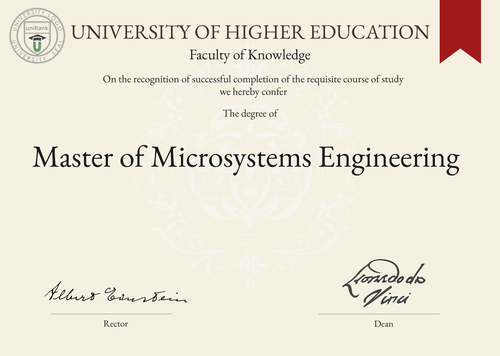
Master of Microsystems Engineering (MME)
Guide to Master of Microsystems Engineering Program/Course/Degree
Master of Microsystems Engineering (MME)

Program Name:
Master of Microsystems EngineeringProgram or Degree abbreviation:
MMEDuration range:
The duration of the program typically ranges from 1.5 to 2 years.Tuition range:
The tuition fees for the program can vary depending on the chosen country or university. It is recommended to check with specific institutions for accurate information.Overview:
The Master of Microsystems Engineering program is designed to provide students with a comprehensive understanding of microsystems technology and its applications. It combines interdisciplinary knowledge from various fields such as electrical engineering, mechanical engineering, physics and materials science.Curriculum Overview by year:
The curriculum is structured to cover both theoretical and practical aspects of microsystems engineering. The coursework is typically divided into the following areas: Year 1: - Introduction to Microsystems Engineering - Semiconductor Devices and Fabrication - Microsystem Design and Simulation - Microsystem Integration and Packaging Year 2: - Advanced Topics in Microsystems Engineering - Microsystem Testing and Reliability - Research Project or ThesisKey Components:
The key components of the program include hands-on laboratory work, research projects and industry collaborations. Students gain practical experience in designing, fabricating and testing microsystems. They also develop skills in project management, problem-solving and critical thinking.Career Prospects:
Graduates of the Master of Microsystems Engineering program have a wide range of career opportunities in industries such as semiconductor manufacturing, biomedical engineering, telecommunications and consumer electronics. They can work as microsystems engineers, research scientists, product development specialists, or consultants.Salary Expectations:
The salary expectations for graduates of the program can vary depending on factors such as location, industry and level of experience. It is advisable to research specific job markets and consult salary surveys for accurate information. For a more accurate understanding of salary expectations, you can utilize the Job Sites Search Engine, from our sister site jobRank, which searches over 4,600 job sites worldwide. Make sure to specify not only the job title but also the country you are interested in.Conclusions:
It is important to note that the duration, tuition fees, curriculum, key components, career prospects and salary expectations of the Master of Microsystems Engineering program can vary based on the chosen country or location for studying the program, as well as the chosen university. Prospective students are encouraged to explore different options and consider their individual preferences and goals. Visitors can search for institutions offering the Master of Microsystems Engineering degree worldwide through the uniRank World Universities Search Engine for more information.World Universities Search Engine
search for Master of Microsystems Engineering (MME) and add the Location (country, state etc.) or specific University you are interested in studying at.
Query examples:
- Master of Microsystems Engineering (MME) United States
- Master of Microsystems Engineering (MME) United Kingdom online
- Master of Microsystems Engineering (MME) Australia international students
- Master of Microsystems Engineering (MME) University of California
- Master of Microsystems Engineering (MME) University of London tuition fees
- Master of Microsystems Engineering (MME) University of Sydney scholarships
Share Program/Course
Interesting? Share this program/course/degree info with your friends now.